Due to Covid-19, the Chinese flower industry has gone through some changes, which may turn out to be positive in the long run. Flowers, which were in the past mainly used for events are now also more used in the household, which in turn seems to increase the demand for higher quality products. In turn, this development is not only expected to have a positive effect on the overall demand for flowers; it may also open possibilities for the flower industry to develop further. This is explained by Xizhe Hu, agriculture advisor at the Consulate General of the Netherlands in Chongqing, a part of the Dutch Agriculture Ministry's network in China.
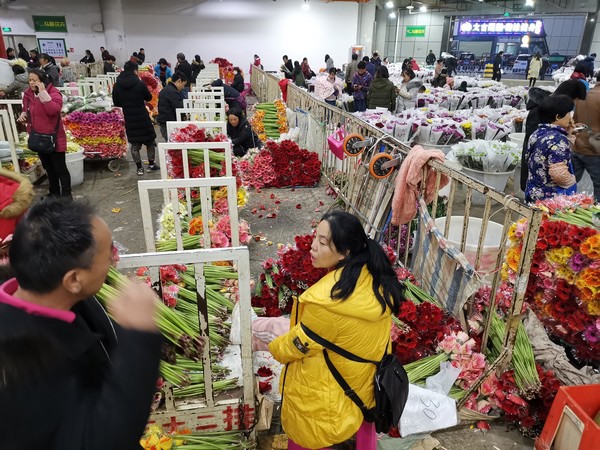
Flower Market in Kunming (at 10pm Dec-5-2019)
How it all started - impact on flower industry
The pandemic started in China, and by the end of January, serious measures had been taken. From January 23, many flower shops closed down and as all kinds of events and gatherings - for which most of the flowers are used - were cancelled, demand for flowers plummeted. And even if flowers were in demand, getting them there was a major challenge, as transportation within China was blocked. One could not go across provinces from Yunnan to Shanghai, Beijing and so on as several villages and towns closed down as well. January and February were challenging months for these flower shops and from March 10, they started to open up one by one under strict measures.
At the flower auction, the 'shut-down' story is a little different. "The Kunming Flower Auction was only closed for four days, from February 6-9, as they could control social distancing well. On February 10, the auction opened its doors, but due to the transportation problems, only few sales could take place. Also the prices at the auction decreased. On some days, the C and D-level flowers received only a few RMB cents per stem, which is almost nothing. Most of these flowers were grown by the smaller local growers and most of them therefore decided to change to another crop, like vegetables, or decided to look for a different business."
Also internationally, logistics was a challenge. Not only flights were cancelled, there was also a lack of sea containers. On top of that, prices skyrocketed. "For the sea freight, prices doubled and for air freight prices even tripled, resulting in making margins difficult. Fortunately the Dutch propagation companies in China did not receive many cancellations."
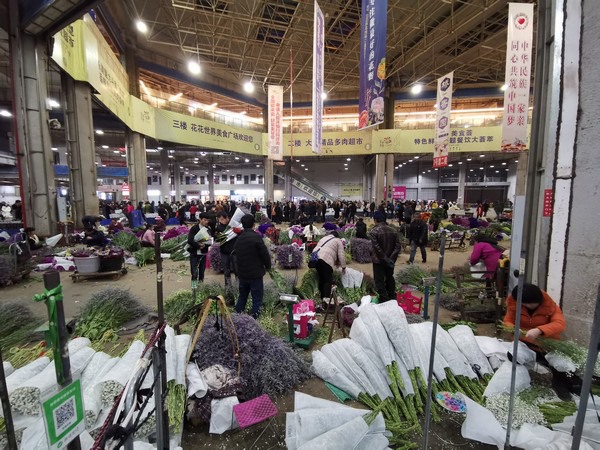
Flower Market in Kunming (at 10pm Dec-5-2019)
Situation started to improve
By mid-March, the situation started to improve. "By March 10, flower shops were opening up slowly under strict measures. The owners and workers had to report where they had been and when they returned to the city where their flower shop is located, they had to go into quarantine for 2 weeks. By the end of March, the shops at the flower market were almost all open again and life started to get back to normal."
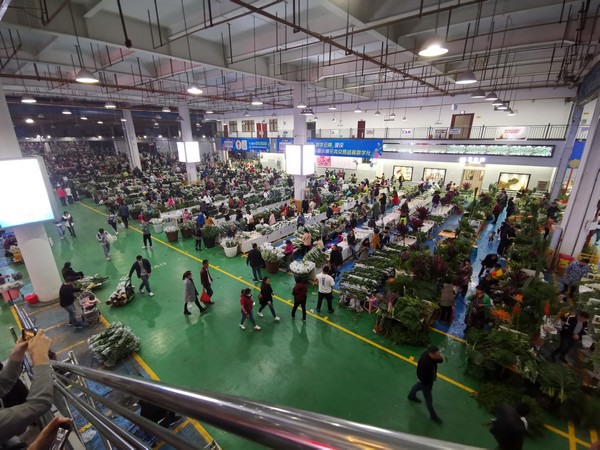
Flower Market in Kunming (at 9pm Oct-25-2020)
85% increase in Chinese Valentine's Day sales
At Kunming Flower Auction, the sales increased sharply in August, explains Hu. "The auction told us that, during the 7 days before Chinese Valentine's Day (August 25th this year) the sales were around 56 million RMB, which was 85% higher than the year before." So what could be the reason? "We think of two reasons. First it might be a sort of compensation. During Valentine's Day on February 14, China was in a lockdown, so no one was thinking about flowers. So, for Chinese Valentine's Day, they probably wanted to catch up on what they'd missed. Secondly, we noticed that the household consumption increased. More people had to stay at home and therefore wanted to beautify their homes with plants and flowers."
Household consumption - increase in demand for quality
Along with the trend of the increase in household consumption is the rise in demand for better quality products, explains Hu. "In the past, flowers were mainly used for events, so the vase life of the flower was not a priority - it only had to be pretty for one day - price had priority. Now, however, since people are more and more using the flowers at their homes, they start to notice the importance of the quality of the flower as the better quality flowers will stay in the vase longer. So they now place quality over price. Currently, at the auction, prices are more or less back to the level they were before, on average about 1 RMB per stem."
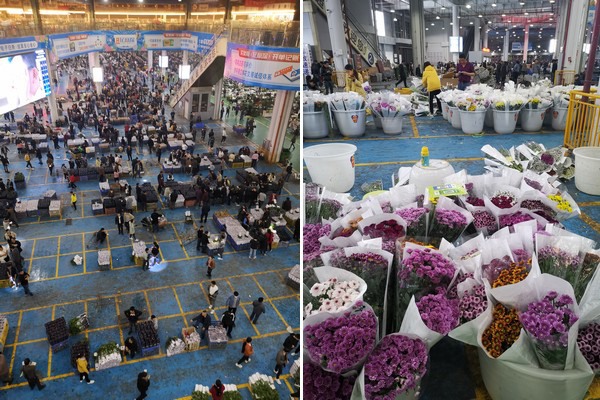
Flower Market in Kunming (at 9pm Oct-25-2020)
IPR awareness
As the market is asking for higher quality products, growers are becoming more aware of the importance of International Property Rights (IPR). "The IPR issue is not only damaging the international breeders, it is damaging the whole sector as there aren't as many new varieties entering the Chinese market as fast as they do in other countries. Due to the bad experience breeders have had with illegal propagation, most of them now are introducing new varieties with a strategy. However, if the market is asking for better quality products, buying plants from professional propagators is expected to become more in demand. Together with several parties, we try to find solutions and offer more clear practices/guidelines for all parties."
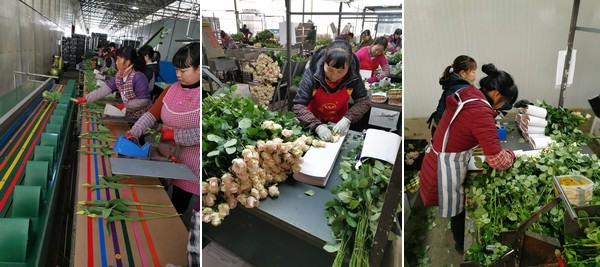
Packing of flowers at Kunming Flower Market.
Positive developments
Covid-19 definitely made 2020 a challenging year, however also a special year creating good hopes for the future. "Household consumption increased which is resulting in a higher demand for quality which in turn raises the awareness and importance of IPR. As part of the LNV agricultural network in China, I keep close contact with Dutch companies who are active here. Due to the COVID-19 epidemic, the way of working has changed a lot. Right now, we are organizing more webinars. For example, late October the Consulate-General in Chongqing, together with Dutch and Chinese counterparts, organized a Flower Cold Chain webinar to improve the supply chain of the flower sector. During this webinar, Dutch experts shared their experiences and knowledge relating to their expertise in the distribution of fresh-cuts."
For more information:
Consulate General of the Kingdom of the Netherlands in Chongqing
Xizhe Hu
Email: Xizhe.Hu@minbuza.nl
www.netherlandsandyou.nl
